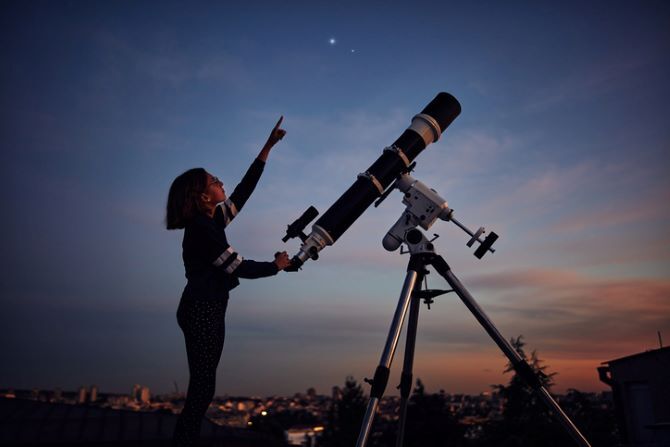Astronomy: inspiring students to reach for the academic stars
During World Space Week (4 to 10 October 2025). OIC Brighton are using astronomy to support their students’ learning and development.

Enhancing STEM skills
With a keen interest in the wonders of the universe, our Computer Teacher’s own astrophotography projects include capturing a globular cluster of stars and the Andromeda Galaxy. Using astrophotography techniques, including image stacking and colour exposure, he has also recorded a stellar nursery using our equipment, demonstrating how new stars are born in detail – a unique opportunity for students to understand more about the creation of our own planet.Inspired by his work, students will have the opportunity to identify their own celestial targets and produce their own astronomical photographs using sophisticated techniques. Astrophotography enables students to familiarise themselves with scientific equipment often found in higher education institutes, such as advanced telescopes and lenses. It also supports the development of important skills that stand them in good stead when they reach university, including the ability to interpret complex visuals, data analysis and independent research. Calculating orbital periods, distances and the positions of stars and planets also strengthens their theoretical understanding and develops spatial reasoning through practical application.In addition to providing hands-on experience of scientific and mathematical classroom learning, exploration of the night sky has interdisciplinary applications. Creativity, problem-solving and curiosity are all hallmarks of innovators from Da Vinci to Thomas Edison to Hedy Lamarr and studying space drives innovations. Just last year, several of our students were invited to participate in a week-long STEAM (science, technology, engineering, arts, and maths) learning project in which they were challenged by Dr Jeff Hoffman, a former astronaut, to invent a filtration device for use on the planet, Mars.Read related articles
- Reaching for the stars: three lessons for thinking big about STEAM
- Congratulations to UK’s first female Astronomer Royal in 350 years – Professor Michelle Dougherty
- To infinity and beyond! Oxford International College Brighton students make intergalactic discoveries
- Next steps for the UK’s space industry
- NASA astronaut embraces ‘Think Global’ innovation message
Strengthening learning in other subjects
Whilst the benefits of astronomy for STEM students are well recognised, the study of the stars also strengthens skills in many other areas. For instance, astrophotography enables young people to express themselves creatively through digital art and image composition. Creating an image of the Andromeda Galaxy can mean layering hundreds of faint images captured over many hours to produce a visualisation of the stars.By providing opportunities for our students to explore more distant worlds, they also gain a much deeper understanding of their own planet. From the gravitational influences of the moon on the tides to the impact of cosmic debris to the disruptive nature of solar weather, the study of natural space phenomena can provide valuable insight into resolving global challenges, for example climate change and resource scarcity. While light pollution can affect our ability to observe stars, it also has a detrimental impact on human health and natural animal behaviours. Understanding how artificial light affects our circadian rhythm and quality of sleep, and the risk this poses to our health helps students connect their learning about the environment to human health (useful for those who want to pursue a career in medicine!). Experiencing truly dark nights is also as important for animals as it is for humans and studying astronomy inspires conversations about the impact of light pollution on migration, feeding and reproduction that our future veterinary students find insightful.Supporting student wellbeing
Astronomy and studying space have wider benefits for young people than supporting their academic development. Just as it promotes an understanding of the role that dark skies play in human and animal routines, it can also have many benefits for children and young people’s wellbeing. At the College, we know that a balanced and healthy lifestyle is essential for both personal development and academic success. Studies have repeatedly shown that spending time in nature, especially if you live in an urban area, can reduce feelings of stress. Whilst many studies focus on daytime experiences of nature, at least one has found that people with a greater connection to the night sky experience better mental health and feel happier. Research also suggests that environments which are less visually arousing, such as the slow movement of the night sky, offer better stress reduction than those that are more stimulating.If you have ever gazed up at the night sky, you may have experienced a feeling of peace or relaxation.Feelings of awe have been shown to lower the heart rate and increase the presence of oxytocin, helping you to feel more positive. Similarly, feeling a sense of belonging and community, such as being part of a club with others who have similar interests, can help to reduce feelings of stress and anxiety. As such, being part of an astronomy club, like our students, can have a significant impact on their overall feelings of wellbeing.For centuries, humans have looked to the skies in fascination with a world beyond our own. At OIC Brighton, we want to encourage our students to look to the skies for many more years. Astronomy is not just about teaching students to study the universe…it is about inspiring them to reach for the stars in every aspect of their lives.

Find out more about the Think Global People and Think Women community and events.
Subscribe to Relocate Extra, our monthly newsletter, to get all the latest international assignments and global mobility news.Relocate’s new Global Mobility Toolkit provides free information, practical advice and support for HR, global mobility managers and global teams operating overseas.
©2026 Re:locate magazine, published by Profile Locations, Spray Hill, Hastings Road, Lamberhurst, Kent TN3 8JB. All rights reserved. This publication (or any part thereof) may not be reproduced in any form without the prior written permission of Profile Locations. Profile Locations accepts no liability for the accuracy of the contents or any opinions expressed herein.































